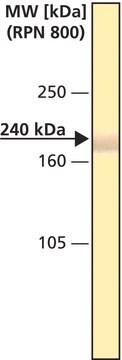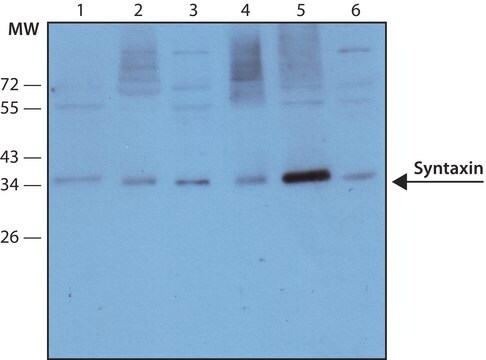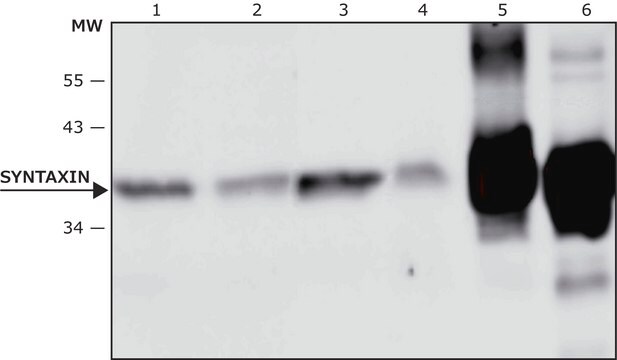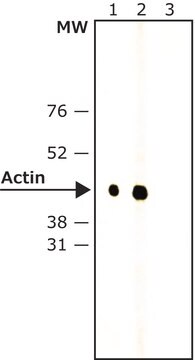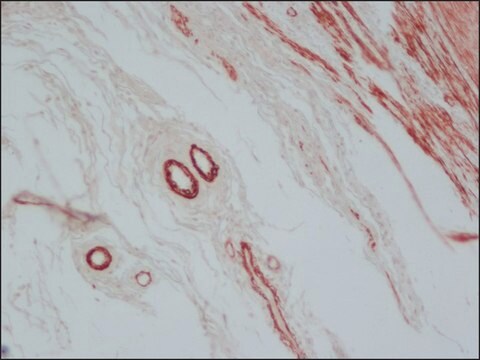S9924
Anti-Syntaxin 4 antibody produced in rabbit
affinity isolated antibody, lyophilized powder
Sign Into View Organizational & Contract Pricing
All Photos(2)
About This Item
Recommended Products
biological source
rabbit
Quality Level
conjugate
unconjugated
antibody form
affinity isolated antibody
antibody product type
primary antibodies
clone
polyclonal
form
lyophilized powder
species reactivity
rat
technique(s)
immunohistochemistry: suitable
western blot (chemiluminescent): 1:300-1:600
UniProt accession no.
storage temp.
−20°C
target post-translational modification
unmodified
Gene Information
human ... STX4(6810)
mouse ... Stx4a(20909)
rat ... Stx4(81803)
Immunogen
synthetic peptide corresponding to amino acids 2-23 of rat or mouse syntaxin 4 (with additional C-terminal cysteine).
Physical form
Lyophilized from phosphate buffered saline, pH 7.4, containing 1% bovine serum albumin and 0.025% sodium azide.
Disclaimer
Unless otherwise stated in our catalog or other company documentation accompanying the product(s), our products are intended for research use only and are not to be used for any other purpose, which includes but is not limited to, unauthorized commercial uses, in vitro diagnostic uses, ex vivo or in vivo therapeutic uses or any type of consumption or application to humans or animals.
Not finding the right product?
Try our Product Selector Tool.
Storage Class Code
11 - Combustible Solids
WGK
WGK 3
Flash Point(F)
Not applicable
Flash Point(C)
Not applicable
Personal Protective Equipment
dust mask type N95 (US), Eyeshields, Gloves
Choose from one of the most recent versions:
Already Own This Product?
Find documentation for the products that you have recently purchased in the Document Library.
B Mandon et al.
The Journal of clinical investigation, 98(4), 906-913 (1996-08-15)
To evaluate the possible role of a putative vesicle-targeting protein, syntaxin-4, in vasopressin-regulated trafficking of aquaporin-2 water channel vesicles to the apical plasma membrane of renal collecting duct cells, we have carried out immunoblotting, immunocytochemistry, and reverse transcription (RT)-PCR experiments
J T Tellam et al.
The Journal of biological chemistry, 272(10), 6179-6186 (1997-03-07)
We have previously identified three mammalian Sec1/Munc-18 homologues in adipocytes (Tellam, J. T., McIntosh, S., and James, D. E. (1995) J. Biol. Chem. 270, 5857-5863). These proteins are thought to modulate the interaction between vesicle membrane and target membrane soluble
M K Bennett et al.
Cell, 74(5), 863-873 (1993-09-10)
Syntaxins A and B are nervous system-specific proteins implicated in the docking of synaptic vesicles with the presynaptic plasma membrane. A family of syntaxin-related proteins from rat has been identified that shares 23%-84% amino acid identity. Each of the six
Kyubo Kim et al.
The Biochemical journal, 446(3), 383-394 (2012-06-15)
Airway mucin secretion and MC (mast cell) degranulation must be tightly controlled for homoeostasis of the lungs and immune system respectively. We found the exocytic protein Munc18b to be highly expressed in mouse airway epithelial cells and MCs, and localized
Shifeng Wang et al.
Traffic (Copenhagen, Denmark), 21(10), 636-646 (2020-08-28)
Exocytosis is a vesicle fusion process driven by soluble N-ethylmaleimide-sensitive factor attachment protein receptors (SNAREs). A classic exocytic pathway is insulin-stimulated translocation of the glucose transporter type 4 (GLUT4) from intracellular vesicles to the plasma membrane in adipocytes and skeletal
Our team of scientists has experience in all areas of research including Life Science, Material Science, Chemical Synthesis, Chromatography, Analytical and many others.
Contact Technical Service
